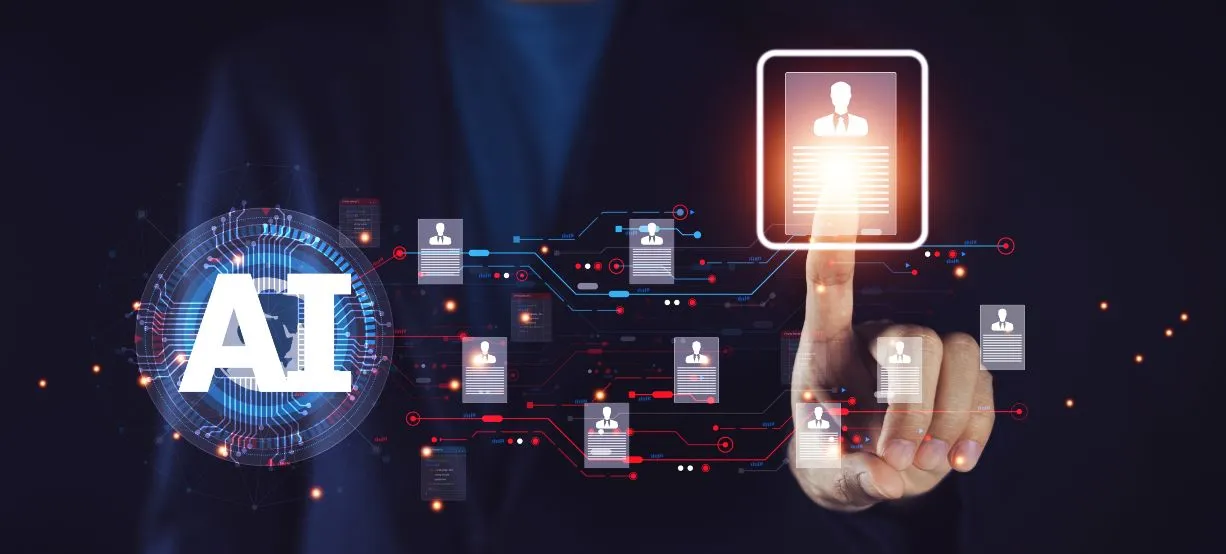
How AI Can Reduce Bias in Human Resource Decisions
8 mins readThe Problem of Bias in HR Decisions
Bias in human resources is a long-standing challenge that affects recruitment, promotions, and performance reviews. In recruitment, bias can appear when candidates are favored or overlooked based on gender, age, or background rather than skills and potential. In promotions, unconscious preferences may influence who gets leadership opportunities, often sidelining equally qualified employees. Even in performance reviews, subjective evaluations can result in inconsistent or unfair assessments. These patterns of bias in HR decisions not only undermine employee morale but also weaken diversity and organizational growth.
Addressing bias is critical because fairness and inclusivity are now recognized as cornerstones of business success. Organizations that fail to manage bias risk higher turnover, lower employee engagement, and reputational damage. On the other hand, companies that build fair and transparent HR systems benefit from stronger talent pipelines, greater innovation, and improved employee trust. Checkout> Certificate in AI for HR Professionals
This is where the role of technology becomes significant. The use of AI in HR offers new ways to mitigate human bias by relying on data-driven insights rather than subjective judgments. From blind resume screening to algorithm-based performance evaluations, AI provides tools that can help HR leaders make fairer, more consistent, and inclusive decisions. However, while AI brings great promise, it must be applied responsibly to ensure it eliminates bias rather than unintentionally reinforcing it. Explore: Artificial Intelligence (AI) Training Courses
Common Types of Bias in Human Resource Management
Bias in HR can appear in many subtle ways, influencing decisions that shape careers and organizational culture. Recognizing the types of bias in HR decisions is the first step toward building fairer and more inclusive workplaces. Below are some of the most common forms of HR bias that affect recruitment, promotions, and performance management.
-
Unconscious Bias in Hiring
Unconscious bias often influences hiring decisions without HR professionals even realizing it. For example, a recruiter may favor candidates of a particular gender, age group, or race due to ingrained stereotypes rather than objective qualifications. This type of bias not only limits workplace diversity but also causes organizations to miss out on highly capable talent. Addressing unconscious bias in hiring is crucial for creating equal opportunities and building stronger, more innovative teams.
-
Affinity Bias
Affinity bias occurs when decision-makers favor candidates who share similar backgrounds, interests, or experiences. For instance, a manager may feel more comfortable with applicants who went to the same university or have similar hobbies, even if other candidates are more qualified. This form of HR bias can result in homogeneity within teams, reducing diversity of thought and limiting innovation. By being aware of affinity bias, HR professionals can make more balanced, merit-based decisions.
-
Confirmation Bias in Performance Evaluation
Another common issue is confirmation bias, where managers look for evidence that confirms their existing opinions about an employee. If a manager perceives someone as underperforming, they may unconsciously focus only on mistakes while overlooking achievements. This leads to unfair performance reviews and missed opportunities for employee growth. Identifying and addressing confirmation bias is essential to ensure that evaluations are accurate, constructive, and supportive of employee development.
In short, understanding these types of bias in HR decisions highlights why organizations must take proactive steps to create fairer systems. The next step is exploring how AI can help reduce these biases and promote equity across HR processes. Explore: HR Management Training Courses
How AI Can Reduce Bias in Recruitment and Hiring
Recruitment is often the stage where bias has the greatest impact, shaping who enters an organization and who is excluded. The use of AI in recruitment provides a practical way to create fairer hiring processes by focusing on skills and potential rather than subjective factors. Through automation and data-driven insights, AI helps organizations minimize bias and standardize candidate experiences.
-
Blind Resume Screening
One of the most effective methods of AI reducing hiring bias is blind resume screening. AI systems can be programmed to ignore personal identifiers such as names, gender, age, or educational background, focusing solely on skills, qualifications, and relevant experience. By doing so, the hiring process becomes more objective, giving every candidate a fairer chance to be considered. This not only improves diversity but also expands the talent pool by highlighting candidates who might otherwise be overlooked.
-
Predictive Analytics Based on Skills, Not Demographics
AI tools in recruitment also use predictive analytics to match candidates with roles based on measurable competencies rather than demographic characteristics. By analyzing data from successful employees, these systems identify patterns in skills and performance that align with job requirements. This shifts the focus away from unconscious preferences and ensures hiring decisions are rooted in objective evidence.
-
AI Chatbots Offering Standardized Candidate Experiences
Another way AI in recruitment reduces bias is through the use of chatbots that interact with candidates. These AI-powered assistants provide consistent answers to applicant questions, schedule interviews, and even conduct initial assessments. Because chatbots interact in a standardized way, they eliminate variations that may arise from human recruiters, ensuring all candidates receive equal treatment during the hiring process. Checkout> AI for Financial Analysis and Planning Course
In essence, the use of AI reducing hiring bias demonstrates how technology can transform recruitment into a more inclusive, equitable process. By prioritizing skills and standardizing interactions, AI helps organizations attract diverse talent while strengthening fairness and transparency in HR practices.
Role of AI in Performance Reviews and Promotions
Performance reviews and promotions are areas where bias can significantly affect employee morale and career progression. Subjective opinions, favoritism, or ingrained stereotypes often lead to unfair evaluations and missed opportunities for capable employees. The application of AI in performance management provides organizations with tools to create fairer, more transparent, and data-driven systems. By reducing reliance on human subjectivity, AI helps ensure that decisions are based on merit and measurable contributions.
-
Data-Driven Evaluations Instead of Subjective Opinions
One of the key ways AI supports fairness is by shifting evaluations away from personal perceptions toward objective, evidence-based insights. AI systems analyze employee performance data such as project outcomes, deadlines met, and collaboration metrics. This minimizes the impact of unconscious biases and strengthens decision-making around promotions and career development. In this way, AI in HR bias reduction ensures that employees are recognized for their actual contributions rather than personal impressions.
-
Continuous Performance Tracking with Measurable KPIs
Unlike traditional annual reviews, AI tools offer continuous performance tracking through measurable key performance indicators (KPIs). These systems monitor employee progress in real time, providing a comprehensive and accurate picture of performance over time. Continuous tracking not only ensures fairness but also enables managers to provide timely feedback, helping employees address challenges before they escalate. Checkout> Certificate in Artificial Intelligence
-
Identifying Overlooked Talent Through Unbiased Analytics
AI-powered analytics can highlight patterns in employee performance that managers might otherwise miss. For example, an employee consistently exceeding expectations in cross-functional projects may go unnoticed in a traditional review process. AI helps identify such hidden talent by analyzing objective performance data across teams and functions. This capability is crucial for building diverse leadership pipelines and ensuring equal access to promotion opportunities.
By integrating AI in performance management, organizations can transform reviews and promotions into processes that reward merit, reduce bias, and encourage transparency. Ultimately, this strengthens employee trust in HR systems and creates a culture of fairness and inclusivity. Checkout> AI-Driven Due Diligence and Contract Auditing Course
Benefits of AI in Reducing HR Bias
The use of artificial intelligence in human resources offers organizations a powerful way to create more equitable and transparent systems. By addressing bias across recruitment, promotions, and performance management, AI helps build workplaces that are diverse, inclusive, and fair. Below are the key benefits of AI in HR when it comes to reducing bias
-
Fairer Hiring Decisions
AI reduces the influence of unconscious bias by focusing on skills, qualifications, and measurable competencies rather than personal identifiers. Automated tools such as blind resume screening and standardized candidate assessments ensure hiring decisions are more consistent and objective. This not only improves fairness but also helps organizations secure the best talent available. Checkout> Compensation, Benefit & Reward Training Course
-
Increased Diversity and Inclusion
One of the most notable outcomes of AI reducing HR bias is its positive impact on workplace diversity. By eliminating demographic preferences and focusing on data-driven insights, AI opens doors for candidates from varied backgrounds. This fosters inclusion, bringing fresh perspectives and innovative ideas that strengthen organizational performance.
-
Greater Employee Trust in HR Processes
Employees are more likely to trust HR systems that are transparent, consistent, and free from favoritism. AI-driven performance management tools provide real-time, evidence-based feedback, ensuring employees are recognized fairly. This fairness improves morale, engagement, and loyalty, making AI a valuable tool in strengthening workplace trust.
-
Stronger Employer Brand and Compliance with Equal Opportunity Laws
Organizations that adopt AI to reduce bias demonstrate their commitment to fairness and equality. This not only enhances their reputation as inclusive employers but also supports compliance with equal opportunity laws and diversity mandates. A stronger employer brand attracts top talent, while legal compliance protects the organization from potential risks.
In summary, the benefits of AI in HR extend beyond operational improvements—they directly contribute to fairness, inclusion, and trust. By reducing HR bias, AI strengthens both employee experiences and organizational success.
Risks and Ethical Challenges of AI in HR Decisions
While AI offers promising solutions to reduce bias and improve fairness in HR, it also brings its own set of challenges. Without careful oversight, AI can unintentionally reinforce the very issues it is meant to solve. Understanding the challenges of AI in HR is essential to ensure that technology is applied responsibly and ethically.
-
Algorithms Can Reflect Bias in Training Data
AI systems learn from historical data, which often contains patterns of discrimination or inequality. If this biased data is not corrected, algorithms can replicate and even amplify unfair practices in hiring, promotions, or performance reviews. This makes it crucial for HR leaders to implement ethical AI in HR decisions, including regular audits and diverse data sets, to ensure outcomes remain fair and inclusive.
-
Over-Reliance on Technology Without Human Oversight
Another concern is depending too heavily on AI without human judgment. While algorithms provide valuable insights, they cannot interpret context, emotions, or unique circumstances. Relying solely on AI risks reducing employees to numbers and metrics, leading to decisions that may feel impersonal or unjust. The best approach is to treat AI as a supportive tool while keeping human oversight central to HR processes.
-
Importance of Transparency and Accountability
One of the biggest ethical concerns is the “black box” nature of many AI systems, where decisions are made without clear explanations. Employees may struggle to understand why they were not hired, promoted, or recognized, which erodes trust. To maintain accountability, organizations must prioritize transparency by explaining how AI systems are used and providing channels for employees to challenge or clarify outcomes.
In short, addressing the challenges of AI in HR requires a balance between technological efficiency and human responsibility. By embedding fairness, transparency, and accountability into AI tools, organizations can embrace innovation while upholding ethical standards in workforce management. Checkout> Employee Counseling Training Course for HR
FAQs on AI and HR Bias Reduction
-
Can AI completely eliminate bias in HR?
While AI in HRM can significantly reduce bias, it cannot eliminate it entirely. AI systems depend on training data, and if that data contains patterns of discrimination, bias can still surface. However, with regular audits, diverse datasets, and human oversight, organizations can minimize these risks and achieve more consistent fairness in HR decisions.
-
Is AI fairer than human recruiters?
In many cases, yes. Unlike humans, AI systems do not rely on emotions, stereotypes, or personal preferences. By focusing on objective data and measurable skills, AI often provides more consistent evaluations. Still, fairness depends on how well the system is designed and monitored. The best outcomes combine bias reduction with AI and the empathy of human recruiters.
-
How do companies ensure AI tools are unbiased?
To ensure fairness, companies must adopt strict practices when implementing AI in HRM. These include testing AI models for bias, using diverse and representative data, and involving cross-functional teams in system design. Regular monitoring and transparency about decision-making criteria further strengthen trust and accountability.
-
What are the risks of biased AI in HR?
The main risks include reinforcing existing discrimination, damaging employee trust, and facing legal or reputational consequences. For example, biased AI in recruitment may exclude qualified candidates based on demographic factors rather than skills. Recognizing these risks is critical to using bias reduction with AI responsibly, ensuring that technology enhances rather than undermines fairness in the workplace. Checkout> HR Essentials for Effective Management
Conclusion
The integration of AI in HR marks a turning point in how organizations approach recruitment, performance reviews, and promotions. By focusing on data-driven insights and objective evaluations, AI offers a powerful tool for reducing bias in HR decisions. From blind resume screening to predictive analytics, these technologies create fairer, more transparent systems that promote diversity, inclusion, and trust in the workplace.
Yet, the effectiveness of AI depends on how responsibly it is applied. Without oversight, algorithms can replicate existing biases or erode employee confidence through a lack of transparency. HR leaders must therefore view AI not as a replacement for human judgment but as a trusted partner that enhances fairness and strengthens decision-making.
By combining the analytical precision of AI with human empathy and ethical responsibility, organizations can create HR practices that are both innovative and inclusive. Embracing AI responsibly ensures that it remains a force for equity—empowering employees, protecting organizational integrity, and building workplaces that thrive on fairness.




